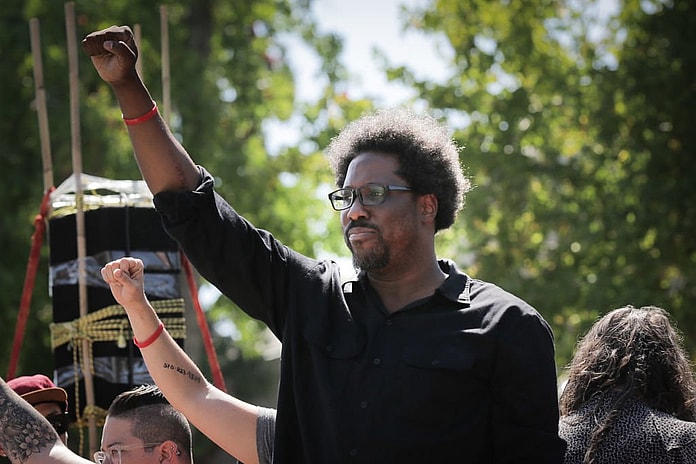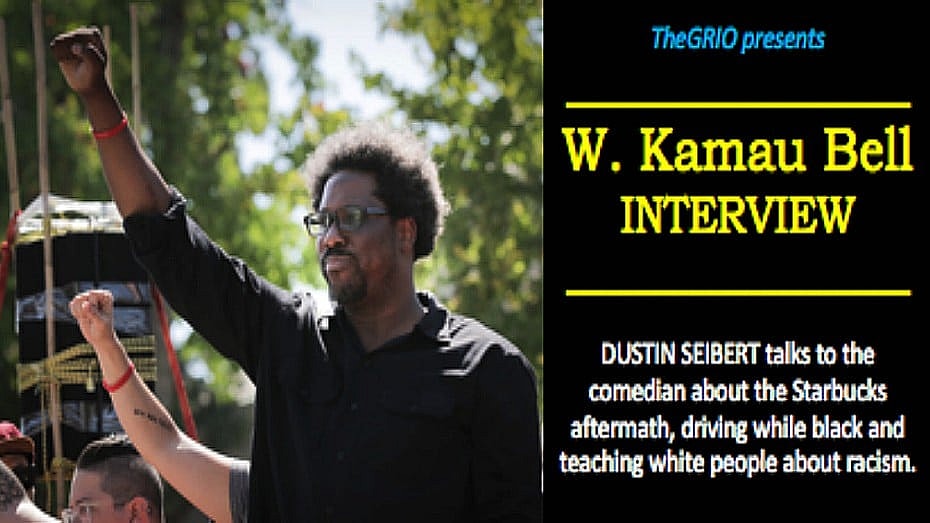If Atlanta is the Blackest sitcom currently on television, comedian W. Kamau Bell’s CNN show United Shades of America is the Blackest documentary series. And just like Atlanta, United Shades will have you laughing through tears, bewilderment or pure disgust.
United Shades seems like an anomaly – a show on the biggest and oldest cable news network hosted by a husky, 6-foot-4 Black dude (with a Fredrick Douglass afro that makes him look even taller) tackling topics that white people don’t understand (HBCUs), are flat-out scared of (Chicago gang culture) or need to muster up the courage to chat about with their one black friend (the “new” Klu Klux Klan).
READ MORE: After viral Waffle House arrest, Chikesia Clemons speaks on humiliation, pain
READ MORE: After Trump supporter calls Angela Rye ‘ghetto’, Black Twitter destroys him
Bell attributes his approach to comedy to his mother, Janet Bell, who had to drop out of her program at Stanford University in the 1970s because they wouldn’t award her a Ph. D in African-American literature at the time.
Her commitment to social consciousness is why Bell is not a “mainstream” comedian who tells jokes solely for the purpose of yuks; most people witnessed his brand of comedy for the first time on his show, FX’s Totally Biased with W. Kamau Bell, which aired for two seasons before it was canceled in 2013.
Despite his penchant for sobering topics, Bell is every bit as jovial in an interview as he comes off on his show – a gift that allows him to have a straight conversation with human fecal material like “Alt-Right” (read: Neo-Nazi) leader Richard Spencer without punching someone in the face.
United Shades of America will air its third season premiere April 29 at 10 p.m. ET/PT.
Any new approach this season?
W. Kamau Bell: The big thing is we didn’t do an obvious villain episode this season. We don’t have an episode with someone like the KKK or Richard Spencer because I felt like I was personally over that. As a country, we’re taking in so much news on social media and dealing with villains all the time that I think we’re ready for a break. There are plenty of other stories to hear about. But we do have Betsy DeVos in there because you gotta have a little Betsy.
Is there anyone you refuse to interview?
WKB: I have to be really interested in the topic. You can tell if I’m not, because I’m not a good actor, as we’ve seen many times. The only people I don’t want to talk to are those who are incapable of having a conversation on the show. We all know Trump is not capable of having a conversation. Say what you will about Richard Spencer or the Klan, but we actually had a back-and-forth. I’m not just looking for people who are just reprehensible. There has to be a reason for the discussion.
How did you feel when Totally Biased was canceled?
WKB: That was a pretty big blow. Most people who watched the show had never heard of me before, so it wasn’t like I had a lot of national name recognition going in. But because Chris Rock produced it, people assumed that I was going to be the next Chris Rock. When it was canceled, I thought my career was over and we moved back to the Bay Area to figure out what happens next. Then, CNN pitched a product they thought would be good for me that ended up turning into United Shades of America. As Chris Rock said to me when we got Totally Biased, un-famous Black guys never get TV shows, un-famous white guys get TV shows all the time, so it was something to get another show.
As a Black man, how is it navigating an industry where most of the people with greenlighting power are white?
WKB: The best thing Chris Rock did for me on Totally Biased is making me an executive producer, not just a writer. If I hadn’t had that, I would’ve just have been hired on United States as talent. It gets me in the room where decisions are made, but even once you’re in those rooms, you still have to sometimes remind the other people in there that you have the power to make the decisions because there’s always just a natural sort of pull towards white maleness.
Given your coffee shop incident from 2015, what do you think of the recent Starbucks drama?
WKB: It’s easy to promise change in the heat of the moment, but when it dies down, are you still going to do the work? In my situation, the café promised a lot, including implicit bias training for everybody in the galaxy. But as soon as the heat died down, they stopped answering emails and returning phone calls. Even yesterday, the San Francisco Chronicle called them about it and they wouldn’t answer. They turtled up. I don’t think Martin Luther King Jr said, “when times get hard, turtle up.” Is Starbucks going to do the work once the headlines fade away? Trump’s two tweets away from distracting us from it. They’ve got the resources, the influence and the power. Don’t just get involved in getting racism out of your store…get it out of America.

Do you tire of explaining racism to people?
WKB: It depends on the relationship I have with the person. If they’re friends of mine and they don’t understand white privilege, okay, I’ll explain. If you’re just a faceless bot on Twitter, I’m just gonna block you. I’m not going to try to explain racism to every person on Facebook who’s clearly just trolling. Plus, at this point, it’s really easy to point people to the resources they need if they really want to do the work themselves.
How have you managed those discussions with your wife, Melissa (who is white)?
WKB: She’s explained to me lot about feminism that I didn’t understand, and I’ve explained a lot about racism to her. When the coffee shop people told us to leave, she wasn’t like, “Oh Kamau you’re exaggerating.” We’re way past that. She [told them off] the way that the way that many Black women do. She called them racist. She told them they were making a big mistake and that we’re never coming back. That’s the way white people need to be allies – they need to do the work for the Black people.
Do you feel you have a social obligation with your work?
WKB: Anti-racism is the family business. We moved around a lot, and my mother put me in the best schools she could find. A lot those were private schools; she would go into these white spaces and ask if they teach African American history and they’d say “no,” and she’s like, “well you do on Tuesday,” and she would schedule time to come talk to the students. I was a kid who grew up watching Saturday Night Live, Eddie Murphy and the artist formerly known as Bill Cosby. So, I wanted to be a comedian, but the type of comedy I do kind of chose me. It looks like a lot of fun to be Kevin Hart, but I can’t do that. I wish I could just write jokes that weren’t about racism, but those jokes just don’t work for me.
When was the last time you were pulled over by the cops?
WKB: I don’t have a driver’s license, so that’s cut out a lot of my driving-while-black stories. Part of the reason I never got one is because when I was 16, I was driving my mom’s brand-new Ford Taurus and I got pulled over by the cops for running a stop light or stop sign that I didn’t run. They got me out of the car and ran everything. I had nothing on me and, luckily, they sent me on my way home, but certainly, Black men die for much less than that in this country.
Dustin J. Seibert is a native Detroiter living in Chicago. Miraculously, people have paid him to be aggressively light-skinned via a computer keyboard for nearly two decades. He loves his own mama slightly more than he loves music and exercises every day only so his French fry intake doesn’t catch up to him. Find him at his own site, wafflecolored.com.


